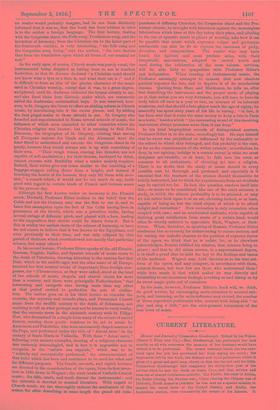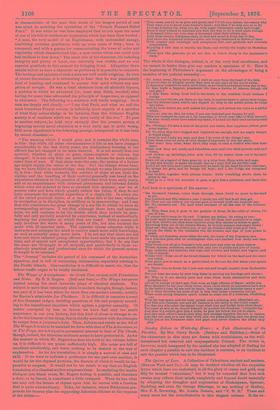CURRENT LITERATURE.
Memoir and Journal of Commodore Goodenough. Edited by his Widow. (Henry S. King and Co.)—Mrs. Goodenough has performed her task exactly as all who reverence the memory of her husband would have wished it to be performed. The severe restraint which she has exer- cised upon her pen has prevented her from saying too much ; the impression left by her work, the distinct and vivid portraiture which it gives of a great and good man, shows us that she has not said too little. Commodore Goodenough had completed the thirty-first year of his service when he met his death at Santa Cruz, and that service had been one of almost continuous activity. The Pacific, the coast of Africa, the Baltic (during the Russian war), China (during the Chinese war of 18d8-60), North America (whither he was sent on a special mission to inspect the naval force of the United States), and finally, the Australian station, were successively the scenes of his labours. It is characteristic of the man that much of his longest period of rest was spent in assisting the operations of the "French Peasant Relief Fund." It was while ho was thus employed that he left upon the mind of one of his fellow-workers an impression which has been thus worded : "A man, the very model of an Englishman, with unbounded energy, combining extreme gentleness with an even sense of duty ; born to command, and with a genius for communicating the lover of order and regularity which characterised him ; a man before whom one could only fool inclined to bow down." The inner side of his character, his unfailing integrity and purity of heart, was naturally less visible, and we owe especial gratitude to this memoir for bringing it out. Altogether there stands before us here a character as perfectas it is possible to conceive. Tho feelings and opinions of such a man are well worth weighing. In view of recent discussions, it is interesting to hear that he was passionately fond of hunting, and continued to pursue this sport without any sus- picion of scruple. He was a total abstainer from all alcoholic liquors, a position to which he advanced (or, some may think, receded) after having for some time advocated the principle of temperance, as opposed to abstinence. The following is a sentence well worth weighing. Such men see deeply and clearly :—" I say that Paris, and what wo call the most luxurious French society, is infinitely more capable of a sacrifice of what they acknowledge to be luxuries, than the virtuous English society is of comforts which are the more costly of the two." To pass to another subject, he held very strongly that the present system of beginning special naval education at a very early age is quite wrong. Still more significant is the following passage, interpreted as it has been by recent disasters :— " The warning which I would give, and it contains the whole case, is this : that while all other circumstances of life at sea have changed considerably in the last thirty years, the preliminary training of our officers has not changed in its main features. It is not merely that our materiel, whether in ships or guns, steam-engines or canvas, has changed ; it is not only that our materiel has become far more compli- cated than of yore. If that alone were the case, the system of a former ago might supply the wants of the day. No ! tho change whose bear- ing we have failed to acknowledge. even though we may have perceived it, is this : that while formerly the conduct of ships at sea, their dis- cipline, and the handling of their materiel generally was based on the experience obtained in the practice of individual lives from early years, and on an acquaintance with external phenomena and internal details which were not reduced to laws or elevated into systems ; now we do possess rules and laws which greatly reduce the value, if they do not quite supersede the practical experience of a single life. In every one of the varied practical duties of a sea officer this is the case, whether in navigation or in discipline, in artillery or in manamvring ; and I say that this constitutes the great change in a sea life to which we have no corresponding advance. I say that although those laws and systems exist, we still continue to let the details which they include be pain- fully and only partially acquired by experience, instead of methodically teaching the principles on which they are based. Such a course not only involves the waste of many years of life, but also burdens the mind with ill-assorted facts. The opposite course educates while it instructs and enlarges the mind to receive much more solid knowledge, as well as actually many more facts. I do not say that there are not here and there talented young officers who have made the most of their time, and of special and exceptional opportunities ; but I do say that the mass are ill-taught in all subjects, and particularly in those ex- clusively practical and professional ones for which the present system is sought to be retained."
The " Journal " includes the period of his command of the Australian squadron, and is full of interesting information, especially relating to the Pacific Islands. One conclusion it is difficult to resist, viz., that the labour-traffic ought to be totally abolished.



































 Previous page
Previous page